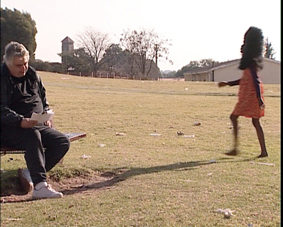Peter Friedl
dal 5/2/2003 al 29/3/2003
Segnalato da
5/2/2003
Peter Friedl
Nicolas Krupp, Basel
For his new project, Berlin-based artist Peter Friedl chooses two specific versions of the King Kong theme for investigating the relationship between adequate and inadequate artistic representation.

King Kong, 2001
video, color, sound
3:57 min., loop
Opening in the presence of the artist thursday 6 february 2003 at 6 pm
open thursday, friday and saturday from 2 - 6 pm and by appointment until 29 march 2003
King Kong is one of the best-known characters ever produced by the Hollywood cinema. Since his first appearance in the 1933 film, directed by Merian C. Cooper and Ernest B. Schoedsack who made their reputations in 1920s colonialist ethnographic cinema, King Kong represents a cross penetration of Western notions of exoticism and monstrosity. Although reductive and stereotyped, the King Kong story stands as an important popularized account of transcultural contact“ (Cynthia Erb in: Tracking King Kong: A Hollywood Icon in World Culture, Detroit 1998). The film´s call to identify with the tormented outsider has historically been answered by spectators outside the mainstream, including international, gay, black, and feminist artists and audiences. King Kong has also become a hero of contemporary cultural studies.
For his new project, Berlin-based artist Peter Friedl chooses two specific versions of the King Kong theme for investigating the relationship between adequate and inadequate artistic representation. The first reference is a song entitled „King Kong“, written by US musician Daniel Johnston in 1983, recorded the same year on „Yip/Jump Music“. The song (only vocal) is the laconic and fatalistic retelling of the King Kong story.
As a second reference, Peter Friedl remembers an important and controversial moment in South African history and culture. The 1959 jazz opera, „King Kong“ was critically esteemed as an interracial collaboration of black and white artists, which gained international prominence as an early expression of the horrors of apartheid (in 1960, the production travelled to London). In reality, „King Kong“ was for the most part a white liberal production (with a book by Harry Bloom, and lyrics by Pat Williams), with only music (by composer and „Drum“ writer Todd Matshikiza) and performances by black South Africans (among them, Miriam Makeba). „King Kong“ remained primarily a blockbuster for white audiences. Based on the tragic life of the heavyweight boxing champ, Ezekiel „King Kong“ Dhlamini, the story is located in Sophiatown, a Johannesburg suburb.
Sophiatown, once a multiethnic center of music, literature, speakeasies, and gangsters, was the „Little Harlem“ of Johannesburg, „perhaps the most perfect experiment in non-racial community living“ (Bloke Modisane). In the late 50s it was gradually bulldozed by the apartheid government. After 1960, a white suburb was raised up and called Triomf (Afrikaans for „triumph“). The „ethnical cleaning“ and destruction of Sophiatown remains the country´s most symbolically charged memory of forced removal and urban segregation.
Shot entirely in Johannesburg, Peter Friedl´s film uses and reflects upon the genre of a music video featuring Daniel Johnston in order to weave together diverse histories and affinities. Johnston performs (for the first time „in public“) his old King Kong song at a public park in today´s Sophiatown/Triomf. The two cameras document his exposure and fatigues, but, at the same time, include panoramic views of the location as well as of the production set and shooting situation itself. The viewpoints and relationships get reversed. History serves as the starting point not of another narrative but of other strategies of coherence.
Based in Waller/Texas, Daniel Johnston (born 1961) has released numerous albums and tapes since 1980, among them Hi, How Are You (1983), Yip/Jump Music (1983), Retired Boxer (1984), Continued Story (1985), 1990 (1990), Artistic Vice (1991), Fun (1994), Frankenstein´s Love (1998), Rejected Unknown (1999), Why Me? (2000). He has repeatedly collaborated and recorded with Jad Fair. Some of his songs have been played and recorded by Cathy McCarty,Yo La Tengo, Half Japanese, Sonic Youth, fIREHOSE, and Pearl Jam. He´s contributed to the film soundtrack of Richard Linklater´s Slacker (1991), and to Larry Clark´s Kids.
King Kong is produced by Andrée Cooke and is realised with financial support from London Arts.
Chisenhale Gallery, London
on the first floor in the office of cassano, lengsfeld & sprenger
ATTA KWAMI
new paintings
next exhibition – 3 april 03 @ 6 pm – werner reiterer
nicolas krupp
erlenstrasse 15
ch – 4058 basel
t + 41 61 683 32 65
f + 41 61 683 32 66
m + 41 79 342 94 06



